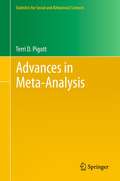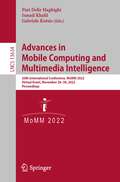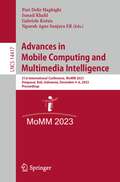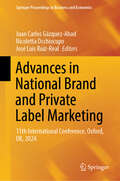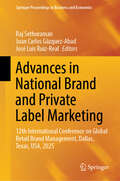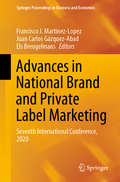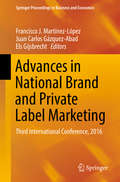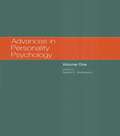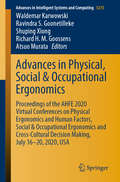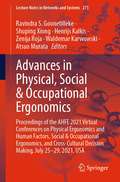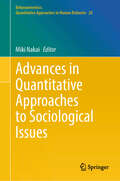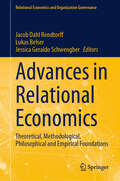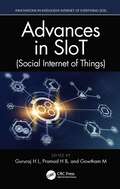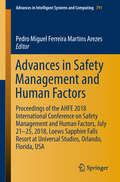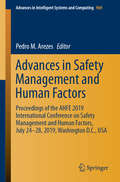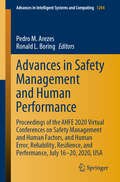- Table View
- List View
Advances in Meta-Analysis (Statistics for Social and Behavioral Sciences)
by Terri PigottThe subject of the book is advanced statistical analyses for quantitative research synthesis (meta-analysis), and selected practical issues relating to research synthesis that are not covered in detail in the many existing introductory books on research synthesis (or meta-analysis). Complex statistical issues are arising more frequently as the primary research that is summarized in quantitative syntheses itself becomes more complex, and as researchers who are conducting meta-analyses become more ambitious in the questions they wish to address. Also as researchers have gained more experience in conducting research syntheses, several key issues have persisted and now appear fundamental to the enterprise of summarizing research. Specifically the book describes multivariate analyses for several indices commonly used in meta-analysis (e.g., correlations, effect sizes, proportions and/or odds ratios), will outline how to do power analysis for meta-analysis (again for each of the different kinds of study outcome indices), and examines issues around research quality and research design and their roles in synthesis. For each of the statistical topics we will examine the different possible statistical models (i.e., fixed, random, and mixed models) that could be adopted by a researcher. In dealing with the issues of study quality and research design it covers a number of specific topics that are of broad concern to research synthesists. In many fields a current issue is how to make sense of results when studies using several different designs appear in a research literature (e.g., Morris & Deshon, 1997, 2002). In education and other social sciences a critical aspect of this issue is how one might incorporate qualitative (e.g., case study) research within a synthesis. In medicine, related issues concern whether and how to summarize observational studies, and whether they should be combined with randomized controlled trials (or even if they should be combined at all). For each topic, included is a worked example (e.g., for the statistical analyses) and/or a detailed description of a published research synthesis that deals with the practical (non-statistical) issues covered.
Advances in Mobile Computing and Multimedia Intelligence: 20th International Conference, MoMM 2022, Virtual Event, November 28–30, 2022, Proceedings (Lecture Notes in Computer Science #13634)
by Ismail Khalil Gabriele Kotsis Pari Delir HaghighiThis volume includes the papers presented at the 20th International Conference on Advances in Mobile Computing & Multimedia Intelligence (MoMM2022), organized in conjunction with 24th International Conference on Information Integration and Web Intelligence. The dominant research focus of submitted papers was artificial intelligence and machine learning. The accepted papers presented advances and innovations in an array of areas such as online teaching, activity and movement detection, greenhouse gas emission, smart irrigation, network security, and video delivery. MoMM2022 attracted 34 papers, from which the Program Committee selected 8 regular papers and 8 short papers.Due to safety concerns as well as other restrictions preventing travel and gatherings, it was decided to organize MoMM2022 as a virtual conference.
Advances in Mobile Computing and Multimedia Intelligence: 21st International Conference, MoMM 2023, Denpasar, Bali, Indonesia, December 4–6, 2023, Proceedings (Lecture Notes in Computer Science #14417)
by Ismail Khalil Gabriele Kotsis Pari Delir Haghighi Ngurah Agus Sanjaya ERThis book constitutes the refereed proceedings of the 21st International Conference on Advances in Mobile Computing and Multimedia Intelligence, MoMM2023, organized in conjunction with the 25th International Conference on Information Integration and Web Intelligence, iiWAS 2023, held in Denpasar, Bali, Indonesia, during December 4-6, 2023.The 10 full papers and 5 short papers presented in this book were carefully reviewed and selected from 37 submissions. The papers are divided into the following topical sections: security in mobile environments; mobile computing and wireless sensors; and image and video processing.
Advances in National Brand and Private Label Marketing: 10th International Conference, 2023 (Springer Proceedings in Business and Economics)
by Francisco J. Martínez-López Juan Carlos Gázquez-Abad Katrijn GielensThe 2023 International Conference on National Brand & Private Label Marketing is a unique academic forum to present and discuss original, rigorous, and significant contributions from researchers around the world on marketing issues facing retailers, store brand managers and national brand managers. The two-day event covered a wide range of topics from varied fields including retailing, marketing, general business, psychology, economics and statistics. The conference addressed diverse areas of application such as branding strategies, innovation in private labels, private label consumers, customer databases, Covid-19 consequences, loyalty programs, sustainability, and online grocery retailing, among others. A wide variety of theoretical and methodological approached have been used in these areas. This volume presents the proceedings of this 2023 NB&PL marketing conference in a collection of original, rigorous, and relevant contributions.
Advances in National Brand and Private Label Marketing: 11th International Conference, Oxford, UK, 2024 (Springer Proceedings in Business and Economics)
by Juan Carlos Gázquez-Abad Nicoletta Occhiocupo José Luis Ruiz-RealThe 2024 International Conference on National Brand & Private Label Marketing is a unique academic forum to present and discuss original, rigorous, and significant contributions from researchers around the world on marketing issues facing retailers, store brand managers and national brand managers. The three-day event covered a wide range of topics from varied fields including retailing, marketing, general business, psychology, economics, and statistics. The conference addressed diverse areas of application such as customer journey, sustainability, the metaverse, online grocery retailing, assortment branding strategies, innovation, labelling, co-creation, among others. A wide variety of theoretical and methodological approaches have been used in these areas. This volume presents the proceedings of this 2024 NB&PL marketing conference in a collection of original, rigorous, and relevant contributions.
Advances in National Brand and Private Label Marketing: 12th International Conference on Global Retail Brand Management, Dallas, Texas, USA, 2025 (Springer Proceedings in Business and Economics)
by Juan Carlos Gázquez-Abad Raj Sethuraman José Luis Ruiz-RealThe 2025 International Conference on Global Retail Brand Management is a unique academic forum to present and discuss original, rigorous, and significant contributions from researchers around the world on marketing issues facing retailers, store brand managers, and national brand managers.The three-day event covered a wide range of topics from various fields including retailing, marketing, general business, psychology, economics, and statistics. The conference addressed diverse areas of application such as customer journey, sustainability, the metaverse, online grocery retailing, assortment branding strategies, innovation, labeling, and co-creation, among others. A wide variety of theoretical and methodological approaches have been used in these areas.This volume presents the proceedings of the 2025 NB&PL marketing conference in a collection of original, rigorous, and relevant contributions.
Advances in National Brand and Private Label Marketing: Eighth International Conference, 2021 (Springer Proceedings in Business and Economics)
by Francisco J. Martínez-López Juan Carlos Gázquez-AbadThis proceedings volume highlights the latest research presented at the 8th International Conference on Research on National Brand & Private Label Marketing (NB&PL2021). The topics covered include: retailing, private label portfolio and assortment management, marketing of premium store brands, using national brands to exclude (delist) and include, optimal assortment size, consumer store patronage, etc. Several contributions also focus on private label pricing and promotion, especially on the relative pricing of standard and premium private labels, and with regard to the national brands in the assortment.
Advances in National Brand and Private Label Marketing: Ninth International Conference, 2022 (Springer Proceedings in Business and Economics)
by Francisco J. Martínez-López Juan Carlos Gázquez-Abad Marco IevaThis proceedings volume highlights the latest research presented at the 9th International Conference on Research on National Brand & Private Label Marketing (NB&PL2022). The topics covered include: retailing, private label portfolio and assortment management, private label pricing and promotion, national brand strategies, among other related issues. The volume specifically addresses the needs of researchers and students of advanced marketing courses.
Advances in National Brand and Private Label Marketing: Seventh International Conference, 2020 (Springer Proceedings in Business and Economics)
by Juan Carlos Gázquez-Abad Francisco J. Martinez-Lopez Els BreugelmansThis proceedings volume highlights the latest research presented at the 7th International Conference on Research on National Brand & Private Label Marketing (NB&PL2020, Barcelona, Spain). The topics covered include: retailing, private label portfolio and assortment management, marketing of premium store brands, using national brands to exclude (delist) and include, optimal assortment size, consumer store patronage, etc. Several contributions also focus on private label pricing and promotion, especially on the relative pricing of standard and premium private labels, and with regard to the national brands in the assortment. Further questions addressed here include: Should store brands be promoted? If so, what types of promotion should be used? How can private label penetration, especially premium private labels, best be dealt with? Are dual branding and coupons viable options?
Advances in National Brand and Private Label Marketing: Sixth International Conference, 2019 (Springer Proceedings in Business and Economics)
by Francisco J. Martínez-López Juan Carlos Gázquez-Abad Anne RoggeveenThe 2019 International Conference on National Brand & Private Label Marketing is a unique academic forum for presenting and discussing original, rigorous and significant contributions from researchers around the world on marketing issues that retailers, store brand managers and national brand managers are facing.The three-day event covered a wide range of topics from varied fields including retailing, marketing, general business, psychology, economics and statistics. Further, it addressed diverse areas of application such as innovation, retail market structure, social media, consumer decision-making, store loyalty, assortment size, digital transformation, ethical aspects, cultural dimensions, and private label pricing. This volume gathers the proceedings of the 2019 NB&PL marketing conference in a collection of outstanding contributions that employ a wide variety of theoretical and methodological approaches.
Advances in National Brand and Private Label Marketing: Third International Conference, 2016 (Springer Proceedings in Business and Economics)
by Francisco J. Martínez-López Juan Carlos Gázquez-Abad Els GijsbrechtThis book presents the latest research on national brand and private label marketing, in the form of original, rigorous and relevant contributions from the 2016 National Brands and Private Label Marketing conference in Barcelona. It covers retailing-related topics, such as brand naming and packaging decisions, price elasticity, positioning, branding, consumer behavior, economic crisis, strategies in growth, and mature private labels.
Advances in Natural, Human-Made, and Coupled Human-Natural Systems Research: Volume 1 (Lecture Notes in Networks and Systems #234)
by Svetlana G. Maximova Roman I. Raikin Alexander A. Chibilev Marina M. SilantyevaThis book is a collection of cutting-edge and cross-disciplinary studies on natural, human-made, and coupled human-natural systems, addressing the challenge of developing integrated knowledge from multiple disciplines. The authors explore the structure, function, and dynamic mechanisms of various systems, both natural and human-made, as well as analyze their reciprocal interactions under the concept of “coupled human-natural systems.” These interactions are used to understand feedback, nonlinearities, thresholds, time lags, legacy effects, and path dependencies, emerging across multiple spatial, temporal, and organizational scales. In other words, this book is a collection of advanced research on unique properties of natural and human-made systems, as well as human-environment dynamics, reciprocal relationships, and cross-scale interactions.The authors outline prospects on building a holistic view of social development and coherent sustainability. Among the topics covered are the following: human networks research; adaptation of local people to social and environmental challenges; coupled dynamics of socioeconomic and environmental systems; critical issues in social science climate change research; education for greater sustainability; peace, justice, and strong institutions; advances in cultural traditions and strategies for social stability; innovative development and barriers to sustainable development; economic systems in the age of digital changes and unstable external environments. The scholars analyze how more effective technologies can enhance resilience, reduce vulnerability, and minimize human impacts on natural systems, taking into consideration critical thresholds to prevent harmful feedback to human systems.The authors grasp the complexity of systems by integrating knowledge of constituent subsystems and their interactions. The framework developed by the authors is used to integrate human and natural systems for achieving greater sustainability, covering critical threats, challenges, and best governance approaches and practices. The research results obtained from studies on coupled human-natural systems are stronger, the authors argue, if compared with traditional (discipline) approaches.
Advances in Natural, Human-Made, and Coupled Human-Natural Systems Research: Volume 2 (Lecture Notes in Networks and Systems #250)
by Svetlana G. Maximova Roman I. Raikin Alexander A. Chibilev Marina M. SilantyevaThis book is a unique collection of advanced research on natural, human-made, and coupled human–natural systems. The contributors analyze the current state of knowledge, address methodological challenges, and explore engaging cases. The chapters demonstrate the balanced disciplinary strength and discuss interdisciplinary perspectives. The authors undertake a holistic and spatially integrative analysis to understand the sustainability of environmental, economic, and social systems, emphasizing the coupled nature of such systems. In particular, the chapters explore biodiversity conservation and natural resources, the sustainability of natural and human-altered ecosystems, sustainability–vulnerability issues in coupled human–natural systems, mechanisms to foster sustainable environmental practices, eventually accumulating sustainability research and practice in various fields. More than that, the challenges of educational and economic systems are studied closely. The authors rely on unique data, develop regional and local knowledge, and explore global trends at local scales. A separate focus is devoted to human health and well-being. The book has seven sections: (1) Advances in Natural and Coupled Human–Natural Systems Research; (2) Economic Systems in the Age of Digital Changes and Unstable Environments; (3) Sustainable Social Systems, Migration Flows, and Social Cohesion; (4) Taking Action for Greater Security and Effective Partnerships for Sustainable Development; (5) Systemic Challenges and Changes in Education Systems in Russia and Around the Globe; (6) Advances in Cultural Traditions and Innovation, Development Barriers, and Social Stability; (7) Human Health and Well-being: Taking Action for Sustainable Development. Written by scholars and practitioners from multiple fields of knowledge, the book is designed for a broader audience interested in the following research areas: systems research and thinking, sustainability research and thinking, system dynamics, management of complexity, decision analysis, organization theory, governance, natural resources, environmental studies, economic development, social policies, cleaner production, innovation, cultural studies, and sustainable practices.
Advances in Natural, Human-Made, and Coupled Human-Natural Systems Research: Volume 3 (Lecture Notes in Networks and Systems #252)
by Svetlana G. Maximova Roman I. Raikin Alexander A. Chibilev Marina M. SilantyevaThis book enables readers to develop a multidisciplinary understanding of natural, human-made, and coupled human-natural systems. The authors explore the structure, function, and dynamic mechanisms of various systems, both natural and human-made, as well as analyze their reciprocal interactions under the concept of “coupled human-natural systems.” The chapters challenge traditional planning and management assumptions and strategies for natural resources, human-altered systems, and the environment.Acknowledging the critical role of effective regulations, policies, and governance structures, the authors analyze advanced research and practices on policy design for managing natural, human-made, and coupled human-natural systems. They conduct impact evaluation and integrative ecosystems assessment, as well as discuss policy interventions and decision-making strategies. They acknowledge the localization of policy design, considering regional and global dynamics that shape responses of local human-made and coupled human-natural systems. A special collection of chapters analyzes legal foundations for sustainable development and strong institution. The authors explore models from both natural and social sciences to obtain and present significant research results.The book is a dispensable source of sustainability research and practice in human-made, natural, and coupled human-natural systems. It is for the scholars, practitioners, and advanced graduate students interested in systems theories, methodologies, and applications.
Advances in Personality Psychology: Volume 1 (Advances in Personality Psychology)
by Sarah E. HampsonIn the first volume of this new series, Sarah E. Hampson brings together a unique collection of critical reviews of key areas of personality psychology and integrative accounts of important work by internationally recognised experts in the field. Advances in Personality Psychology includes chapters on cross-cultural evidence for the Big-Five framework for personality description, type and trait approaches to understanding childhood personality, developments in psychometrics, the relationship between hostility and cardiovascular disease, and the connections between personality and emotions. In further chapters the view that personality cannot change in adulthood is challenged and the importance of environmental factors is revealed by an observational study of twins. This state-of-the-art volume will provide students, teachers and researchers of contemporary personality psychology with a highly valuable resource on recent developments in this area.
Advances in Physical, Social & Occupational Ergonomics: Proceedings of the AHFE 2020 Virtual Conferences on Physical Ergonomics and Human Factors, Social & Occupational Ergonomics and Cross-Cultural Decision Making, July 16–20, 2020, USA (Advances in Intelligent Systems and Computing #1215)
by Waldemar Karwowski Richard H. M. Goossens Ravindra S. Goonetilleke Atsuo Murata Shuping XiongThis book reports on cutting-edge findings and developments in physical, social and occupational ergonomics. It covers a broad spectrum of studies and evaluation procedures concerning physical and mental workload, work posture and ergonomic risk. Further, it reports on significant advances in the design of services and systems, including those addressing special populations, for purposes such as health, safety and education, and discusses solutions for a better and safer integration of humans, automated systems and digital technologies. The book also analyzes the impact of culture on people’s cognition and behavior, providing readers with timely insights into theories on cross-cultural decision-making, and their diverse applications for a number of purposes in businesses and societies. Based on three AHFE 2020 conferences (the AHFE 2020 Virtual Conference on Physical Ergonomics and Human Factors, the AHFE 2020 Virtual Conference on Social & Occupational Ergonomics, and the AHFE 2020 Virtual Conference on Cross-Cultural Decision Making), it provides readers with a comprehensive overview of the current challenges in physical, social and occupational ergonomics, including those imposed by technological developments, highlights key connections between them, and puts forward optimization strategies for sociotechnical systems, including their organizational structures, policies and processes.
Advances in Physical, Social & Occupational Ergonomics: Proceedings of the AHFE 2021 Virtual Conferences on Physical Ergonomics and Human Factors, Social & Occupational Ergonomics, and Cross-Cultural Decision Making, July 25-29, 2021, USA (Lecture Notes in Networks and Systems #273)
by Waldemar Karwowski Ravindra S. Goonetilleke Atsuo Murata Shuping Xiong Henrijs Kalkis Zenija RojaThis book reports on cutting-edge findings and developments in physical, social and occupational ergonomics. It covers a broad spectrum of studies and evaluation procedures concerning physical and mental workload, work posture and ergonomic risk. Further, it reports on significant advances in the design of services and systems, including those addressing special populations, for purposes such as health, safety and education, and discusses solutions for a better and safer integration of humans, automated systems and digital technologies. The book also analyzes the impact of culture on people’s cognition and behavior, providing readers with timely insights into theories on cross-cultural decision-making, and their diverse applications for a number of purposes in businesses and societies. Based on the AHFE 2021 conferences on Physical Ergonomics and Human Factors, Social & Occupational Ergonomics, and Cross-Cultural Decision Making, held virtually on 25–29 July, 2021, from USA, it provides readers with a comprehensive overview of the current challenges in physical, social and occupational ergonomics, including those imposed by technological developments, highlights key connections between them, and puts forward optimization strategies for sociotechnical systems, including their organizational structures, policies and processes.
Advances in Physiological Computing (Human–Computer Interaction Series)
by Stephen H. Fairclough Kiel GilleadeThis edited collection will provide an overview of the field of physiological computing, i. e. the use of physiological signals as input for computer control. It will cover a breadth of current research, from brain-computer interfaces to telemedicine.
Advances in Quantitative Approaches to Sociological Issues (Behaviormetrics: Quantitative Approaches to Human Behavior #20)
by Miki NakaiThis edited book is the first one in English that demonstrates the innovative use of cutting-edge statistical methods for sociological and social science data. Unlike books that focus solely on applying quantitative methods to sociological and social science data, this book includes in-depth methodological discussions that highlight the interplay between sociological theory and data analysis. With expertise in sociology, psychology, social statistics, and survey methods and data collection, researchers in quantitative social science have developed extended, improved methods such as multivariate statistical analysis, survey methods, cluster analysis, multidimensional scaling, correspondence analysis, latent state model, network analysis, and other means tailored for cross-sectional, longitudinal, compositional, and network data to contribute to solving society's greatest challenges. The purpose of the book is twofold. One is to represent studies focusing on new directions in statistical analysis of sociological and social science data. These new directions may include novel theoretical paradigms, developing topical areas of research, innovative methodologies, and/or substantive findings that explore social processes. The other is to offer the most appropriate models and methods for explaining social phenomena and their underlying structures with the goal of discovering useful information, drawing conclusions, and supporting decision-making. The methodological discussions empower researchers to make informed decisions about research design, data collection, and analysis, enhancing the quality and validity of their sociological inquiries.
Advances in Rasch Analyses in the Human Sciences
by William J. Boone John R. StaverThis volume follows the publication of Rasch Analysis in the Human Sciences. This new book presents additional topics not discussed in the previous volume. It examines key topics such as partial credit analysis of data, common person linking, computing equating constants, investigating discrimination, evaluating dimensionality, how to better utilize Wright Maps, how to design tests and surveys using Rasch theory, and many more. The book includes activities which can be used to practice the theme of each chapter and to test the reader’s understanding of Rasch techniques. Beginning and ending with a conversation between two students, each chapter provides clear step-by-step instructions as to how to conduct an analysis using the chapter theme. The chapters emphasize applications for the beginner learning Rasch and provide guidance for composing a write-up of an analysis for a presentation, paper, thesis or report.This book explores in detail many important yet often rarely discussed topics in Rasch. With its easy-to-read language and engaging format it reaches a wide audience of scientists, clinicians, students, researchers and psychometricians, providing a valuable toolkit for practical users of Rasch analysis. – Dr. Eva Fenwick, Clinical Research Fellow, Singapore Eye Research Institute (SERI) Assistant Professor, Duke-NUS Medical School, Singapore It is an easy to read book and provides immediate guidance for those wishing to conduct a Rasch analysis. The “conversations” between students in each chapter provides a welcome introduction to each topic. – Prof. Maik Walpuski, University Duisburg-Essen, GermanyThe lessons learned in their first book are extended by providing insightful demonstrations of some of the more complex concepts and techniques used in applying Rasch models. – Dr. Michael R. Peabody, National Association of Boards of Pharmacy, Illinois, USAI am amazed with the ability of these authors to communicate complicated knowledge, and the ability to make this highly complicated knowledge accessible to new learners guiding every step of the way. Through this book we get important knowledge about techniques and the different areas of use for Rasch methods in the human sciences This is truly an important book for students and researchers. – Prof. Charlotte Ringsmose, Aalborg University, Denmark
Advances in Relational Economics: Theoretical, Methodological, Philosophical and Empirical Foundations (Relational Economics and Organization Governance)
by Jacob Dahl Rendtorff Jessica Geraldo Schwengber Lukas BelserThis book explores how economic and social values are created through dynamic, non-linear interactions within cooperative networks. Emphasizing the importance of relations and networks in value creation, the book discusses critical issues such as the relational nature of the firm, relational management and leadership as well as relational philosophy. This includes topics such as network models, stakeholder management, relational contracts, cooperative economics as well as philosophical questions related to relational ontology, epistemology and methodology, inter alia. Written by leading scholars, the contributions highlight the need for new business models and governance mechanisms that integrate resources across different economic and social systems, advocating for a relational approach to economic theory. In turn, the book argues for a network-based, integrative view of businesses, suggesting that economic success is increasingly dependent on the ability to navigate and foster complex relationships within a globalized context. Rich in theoretical and empirical insights, this book is essential reading for academics, policymakers, and business leaders interested in the future of economic thought and practice. It provides a comprehensive overview of the relational paradigm. The book is an invitation to join the conversation on how relational perspectives can transform our understanding of economics, governance, and organizational dynamics.
Advances in SIoT (Innovations in Intelligent Internet of Everything (IoE))
by H L Gururaj H B Pramod M GowthamThe Social Internet of Things (SIoT) has become a hot topic in academic research. It employs the theory of social networks into the different levels of the Internet of Things (IoTs) and has brought new possibilities for the development of IoTs. Essentially, the SIoT is a subset of IoTs. It uses intelligent hardware and humans as the node, a social network as the organization type, the social relationship between things, things and humans, and between humans, formatting research methods and models with social network characteristics to realize the connection, service, and application of the IoTs. Moreover, SIoT is a form of realization of technology, architecture, and application of the IoTs using social network research methods. It further promotes the integration between real-world and virtual cyberspace, contributes the realization of the IoTs, expands the research scope of the social networking, and provides a new solution for the specific problems of the IoTs. Consequently, there is a tremendous need for researchers to have a comprehensive knowledge of the advances in SIoT. This special issue is soliciting scientific research papers that can present a snapshot of the latest research status of SIoT.
Advances in Safety Management and Human Factors: Proceedings of the AHFE 2018 International Conference on Safety Management and Human Factors, July 21-25, 2018, Loews Sapphire Falls Resort at Universal Studios, Orlando, Florida, USA (Advances in Intelligent Systems and Computing #791)
by Pedro Miguel ArezesThis book discusses the latest findings on ensuring employees’ safety, health, and welfare at work. It combines a range of disciplines – e.g. work physiology, health informatics, safety engineering, workplace design, injury prevention, and occupational psychology – and presents new strategies for safety management, including accident prevention methods such as performance testing and participatory ergonomics. The book, which is based on the AHFE 2018 International Conference on Safety Management and Human Factors, held on July 21–25, 2018, in Orlando, Florida, USA, provides readers, including decision makers, professional ergonomists and program managers in government and public authorities, with a timely snapshot of the state of the art in the field of safety, health, and welfare management. It also addresses agencies such as the Occupational Safety and Health Administration (OSHA) and the National Institute for Occupational Safety and Health (NIOSH), as well as other professionals dealing with occupational safety and health.
Advances in Safety Management and Human Factors: Proceedings of the AHFE 2019 International Conference on Safety Management and Human Factors, July 24-28, 2019, Washington D.C., USA (Advances in Intelligent Systems and Computing #969)
by Pedro M. ArezesThis book discusses the latest findings on ensuring employees’ safety, health, and welfare at work. It combines a range of disciplines – e.g. work physiology, health informatics, safety engineering, workplace design, injury prevention, and occupational psychology – and presents new strategies for safety management, including accident prevention methods such as performance testing and participatory ergonomics. The book, which is based on the AHFE 2019 International Conference on Safety Management and Human Factors, held on July 24-28, 2019, Washington D.C., USA, provides readers, including decision makers, professional ergonomists and program managers in government and public authorities, with a timely snapshot of the state of the art in the field of safety, health, and welfare management. It also addresses agencies such as the Occupational Safety and Health Administration (OSHA) and the National Institute for Occupational Safety and Health (NIOSH), as well as other professionals dealing with occupational safety and health.
Advances in Safety Management and Human Performance: Proceedings of the AHFE 2020 Virtual Conferences on Safety Management and Human Factors, and Human Error, Reliability, Resilience, and Performance, July 16-20, 2020, USA (Advances in Intelligent Systems and Computing #1204)
by Ronald L. Boring Pedro M. ArezesThis book brings together studies broadly addressing human error and safety management from the perspectives of various disciplines, and shares the latest findings on ensuring employees’ safety, health, and welfare at work. It combines a diverse range of disciplines – e.g. work physiology, health informatics, safety engineering, workplace design, injury prevention, and occupational psychology – and presents new strategies for safety management, including accident prevention methods such as performance testing and participatory ergonomics. It reports on cutting-edge methods and findings concerning safety-critical systems, defense, and security, and discusses advanced topics regarding human performance, human variability, and reliability analysis; medical, driver and pilot error, as well as automation error; and cognitive modeling of human error. Further, it highlights cutting-edge applications in safety management, defense, security, transportation, process controls, and medicine. Gathering the proceedings of the AHFE 2020 International Conference on Safety Management and Human Factors and the AHFE 2020 Virtual Conference on Human Error, Reliability, Resilience, and Performance, held on July 16–20, 2020, USA, the book offers an extensive, timely, and multidisciplinary guide for researchers and practitioners dealing with safety management and human error.
